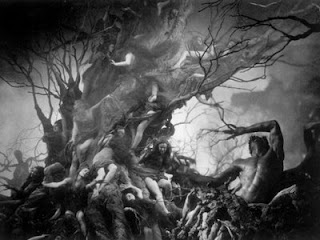 |
| The Forest of Suicides in Dante’s Inferno |
Dante groups into one of his deep circles of hell two types of sinners – suicides (those who took their own lives) and squanderers (those who wasted their resources).
These are both guilty, according to Virgil, of sins “against self”. One of the squanderers Dante meets was a man, who, when alive, would mockingly throw coins into the river, and who once gathered all of his goods into his house and burned it for the shallow entertainment of his friends.
Like suicides, these sinners deliberately and maliciously waste what was given to them. They pervert the true ends of their gifts, and refuse to affirm the purpose for which they or their riches or talents were made.
Anthonly Esolen (whose translation we are reading) points out how we are all tempted to distance ourselves from ourselves, to become not only god and not only the creator – but to become our own god and our own creator.
This is the source of that elusive “unreality” that I’ve been trying to describe.
Shakespeare has Olivia say in Twelfth Night, “Ourselves we do not owe”, meaning “Ourselves we do not own.” But we like to think we do.
This is probably the most common type of wrong-headedness that you’ll see, both among Catholics and secularists. We want to manipulate our lives; following God’s call, giving ourselves over to that challenging and frightening feeling of stepping out of the boat and onto the water, where He’s bidding us to follow, is just too much. We’d rather medicate our pain, adjust our lives, and find artificial and contrived substitutes for Reality. Thus the bad music at Mass; thus the bubble-wrapped children of the cautious Christians; thus even the pop nihilism of our day.
***
And yet, these same acts of suicide and waste are close in a way to honorable things.
A man who dies while trying to save another is noble and heroic, even if he knows that such a sacrifice might result.
A man who gives his money to the poor and follows Christ, renouncing all worldly possessions, is likewise noble and heroic, knowing full well the reason and the Person behind his sacrifice.
When we sacrifice our better selves to our baser selves, it is no sacrifice. It is squandering or suicide.
When we sacrifice our baser selves to something beyond ourselves, it is a great act of love.





Sooo very well said, Kevin. Thanks.